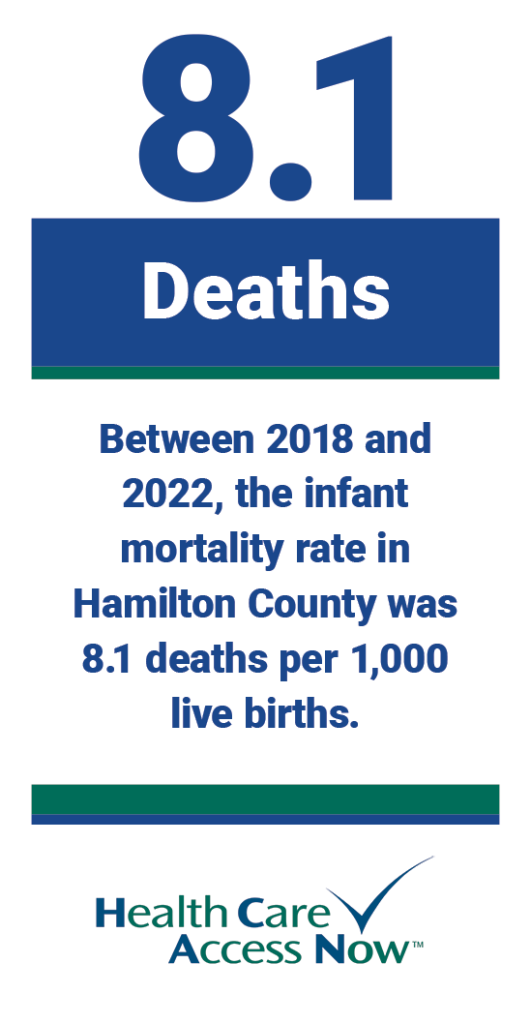How Cradle Cincinnati helps birthing parents address stress for better outcomes

“Social determinants of health are stressors that relate to physical health.” So says Dr. Meredith Shockley-Smith, Executive Director of Cradle Cincinnati, Field Service Assistant Professor at UC Medical Center, and Founder of Queens Village. “And chronic, prolonged stress just magnifies [health] problems.”
Consistent access to nutritious food, affordable and suitable housing, and transportation are just a few examples of social determinants of health. Health Care Access Now (HCAN) trains and dispatches Community Health Workers (CHWs) to work with program participants one-on-one in the field. CHWs establish rapport with participants to identify and eliminate barriers to good health outcomes.
One such good health outcome comes through supporting birthing people in carrying their babies to term and keeping infants alive.
Infant mortality in the Cincinnati region
Between 2018 and 2022, the infant mortality rate in Hamilton County was “8.1 deaths per 1,000 live births.” While this remains slightly above the state (7.1) and national (5.8) rates, it demonstrates a marked decrease over the last decade.
Cradle Cincinnati takes a three-pronged approach to ending infant mortality:
- Family support through Cradle Cincinnati Connections, a team of CHWs and health professionals that provides assistance as varied as transport to doctors’ appointments, getting needed baby supplies, and securing housing.
- Empowering Black women’s voices, ideas, and actions through Queens Village, which allow Black women (more than 1,200 participants) to come together for support—in turn lowering stress and thereby preterm birth.
- Transforming systems through the Cradle Cincinnati Learning Collaborative and the Cradle Cincinnati Policy Committee, which work in tandem to transform prenatal care through quality improvement and identify and advocate for local and statewide policy change.
This holistic approach has allowed Cradle Cincinnati to make significant strides toward saving babies. Since Cradle Cincinnati’s formation, Hamilton County’s rate of preterm births has decreased by 10 percent, and there has been an 11 percent decline in all infant deaths.
Stress, weathering, and connection
Shockley-Smith says stress contributes to preterm births. The formation of Queens Village helps Black women, “who often feel unseen, unheard, and undervalued,” come together and counteract that messaging.
Sojourner Syndrome demonstrates the hardships that Black women face because of the way others view them. Black women face chronic stress because of constant exertion and perpetual obstacles. Coping with that stress further depletes their energy, and they “become more susceptible to disease and illness.”
This is representative of the concept of “weathering,” which explains that Black women’s “exposure to institutionalized racism and pollutants, obligations to family and kinship networks, and deprivation causes early onset of chronic illness and increases their risk of early disability and mortality.”
Black women have been shown to have higher allostatic load, or “cumulative burden of chronic stress and life events,” that lead to poor health outcomes.
In other words, Black women face more stress than most other people do. And that stress can be compounded by isolation. Shockley-Smith says community care can make a big difference.
“When you [participate] in a community who bring more resources to the table, who can hold you accountable for your self-care, who can help you feel less overwhelmed,” it takes some of the pressure off societal expectations of Black women and birthing people.
“[The birthing parent] is often the last person to be cared for,” she says. The focus is on the baby. While the baby is certainly an important part of the equation, the baby’s care givers also need support.
What communities really need
Shockley-Smith says Queens Village is “core work” for Cradle Cincinnati. An epidemiologist compiles and analyzes data that comes from Queens Village listening circles, surveys, and field notes. Then, through funds provided by trust-based philanthropy (such as through bi3 and Interact for Health), the true needs and desires of the community can be addressed.
“We’re honest and open about what we can do up front,” Shockley-Smith says. “That creates a trusted relationship.”
“We provide a space where communication flows in both directions,” she says. CHWs and other care providers impart information and resources, for example. But there are also spaces provided for people to get to know each other to “empathize and create relationships and trust.” For example, through Story Share, medical providers and Black birthing people get together to do just that: share stories. Those “human, authentic connections” can expose and lessen implicit biases.
Stressors lead to stressors
Other top stressors include housing and mental health. “The process [to access affordable, suitable housing] is taxing and long. There are a lot of folks waiting,” says Shockley-Smith. “And maybe that’s why mental health is another top stressor.”
She says that people sometimes approach Cradle Cincinnati just to do the depression scale they administer. “Post-partum depression is a very real issue,” and Cradle Cincinnati responds with a variety of interventions, including direct and wraparound services, as well as community activation and policy work.
Cradle Cincinnati prefers to assign CHWs to birthing parents early in the process. “They’re an objective party who assesses needs and obstacles,” which could range from not having the ability to take time off work to sleep issues. “Often, new parents don’t recognize post-partum depression” because the overwhelm they experience could simply be attributed to having an infant. CHWs can help them recognize their own issues.
Infant mortality is a complicated issue that requires solutions that attack it from all fronts. Cradle Cincinnati aims to do just that—all while keeping humanity and empathy in the forefront. “We have a lot of intervention options,” says Shockley-Smith, all of which can help lessen stress for birthing parents as they raise healthy infants.








